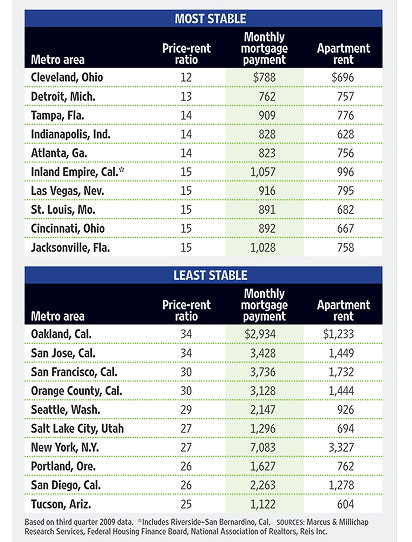Is Renting a Home Better Than Buying
Post on: 14 Октябрь, 2015 No Comment

Is Renting a Home Better Than Buying?
By: Jeff Brown
Despite a few bright spots, news from the housing market is mostly grim. Nationally, average home prices have fallen more than 19 percent over the past 12 months, according to the S&P/Case-Shiller national home-price index.
If you have a cast-iron stomach, this might be a good time to bargain hunt. But many people may be better off renting.
Over the long haul, owning a home rather than renting generally pays off. Over the years, a fixed monthly mortgage payment may take a smaller and smaller portion of your growing income, leaving more money to invest for retirement, college or other long-term goals.
At some point, most homeowners own their homes free and clear, while renters are never off the hook and generally pay more each year. The home is a valuable asset to the homeowner, but worth nothing to the renter.
Over shorter periods, however, renting can be the better option. It doesn’t involve the huge up-front costs of home buying, the ongoing maintenance expense and hassles, or the steep sales commission when you’re ready to move.
Most important, you are free to move on short notice. Today, many homeowners who have lost their jobs are unable to relocate for new ones because they are trapped by their homes, unable to sell for as much as they owe on their mortgages.
The Rent vs. Buy calculator can help make sense of the numbers, but additional factors should be considered.
If you bought a $300,000 home with $60,000 down and a 5 percent fixed-rate mortgage, you could break even in 2.5 years, assuming you could rent a comparable place for $1,600 a month. (Other factors have been left at the calculator’s default values.)
In other words, counting factors like taxes and potential investment return on down payment funds if you rent instead of buying, home ownership would beat renting on a financial basis so long as you owned for at least 2.5 years.
But notice that one of the adjustable variables is home appreciation. The default level is 3 percent a year, meaning the $300,000 home would be worth $309,000 after one year, $318,270 after two years and so forth.
Reduce that figure to 1 percent and the break even period jumps to 4.8 years. At zero percent it’s 7.2 years.
These days, zero percent appreciation is not all that bad. The calculator won’t take a negative number, but it’s easy to imagine what would happen if, for example, prices were to drop by 5 percent a year for three years, then resume a 3 percent annual increase. Your home would lose about 15 percent of its value in three years and would then take five more to get back to where you started, a total of eight years.
With appreciation continuing at 3 percent it would take another 2.5 years to break even once commissions, taxes and other factors were taken into account. So it probably wouldn’t pay to buy this home unless you expected to stay there for more than 10.5 years.
There’s a lot of guesswork in this kind of calculation, since you don’t know what appreciation rates will be, how much your rent might rise over time or what kind of investment return you could earn on money that’s not put into housing.
But there’s no doubt that periods of low home-price appreciation or falling home values dramatically undermine any financial benefits of owning over renting.
To use the calculator to explore your options, start by researching mortgage rates with the BankingMyWay.com search tool. Rates have been going up recently, with the 30-year fixed-rate loan averaging 5.536 percent, according to the BankingMyway.com survey.
But you may be able to beat the averages. Beneficial Bank of Philadelphia (Stock Quote: BNCL ) and Wells Fargo (Stock Quote: WFC ), for instance, offer a 30-year fixed loans at 5 percent.
For more ways to save, spend, invest and borrow. visit MainStreet.com.














